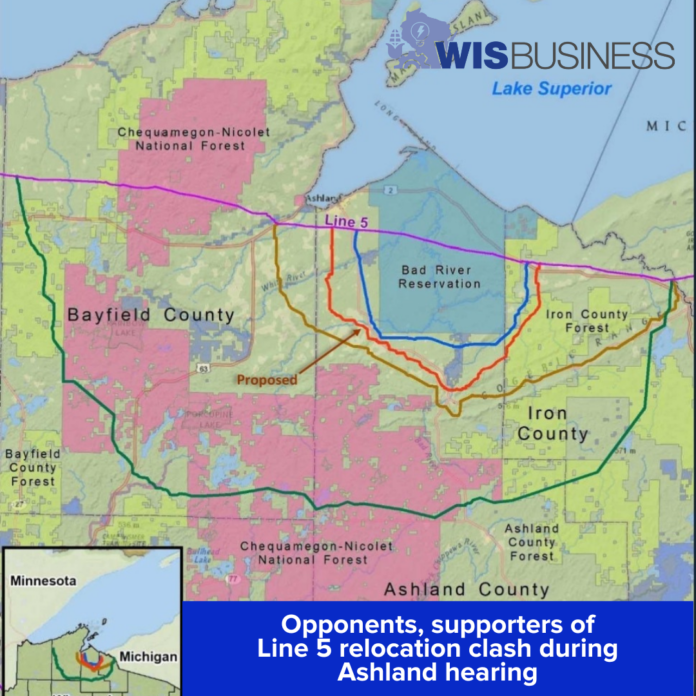Opponents of a proposed oil pipeline relocation are raising concerns about environmental harm while supporters of the Enbridge Line 5 proposal frame the project as an economic boon for the region.
The U.S. Army Corps of Engineers held a public hearing in Ashland yesterday on Enbridge’s application to relocate a 12-mile segment of Line 5 and build a new 41-mile segment outside the Bad River Band of Lake Superior Chippewa reservation.
The proposal comes after a federal judge ruled in 2022 Enbridge had illegally trespassed on the Bad River Band of Lake Superior Chippewa’s land. The decision is now on appeal before the U.S. Court of Appeals.
At a press conference ahead of the hearings, Dan Wiggins Jr. of the Bad River Band of Lake Superior Chippewa said what Enbridge is doing “just isn’t right” and the company has negated tribal sovereignty.
“We struggle to see why it is so hard to protect our waters, to protect our lands. And we struggle to see why there’s so many people in support of Line 5,” Wiggins said.
During the hearing, Anya Janssen, a staff attorney for Midwest Environmental Advocates, said the corps should reject the relocation proposal and should consider shutting down the pipeline. Janssen requested the Corps conduct an environmental impact statement, which she said would demonstrate the need to deny the proposal.
“Do not abdicate this responsibility to a foreign corporation that puts profit over the health of communities and natural resources and that has a horrendous track record for environmental contamination and endangerment,” Janssen said.
Janssen also criticized the proposed use of horizontal drilling, a method she said led to spills at the Enbridge Line 3 pipeline.
“These outcomes are neither inadvertent nor unforeseeable, but rather are predictable and likely consequences,” she said.
Craig Summerfield, director of environmental & energy policy at Wisconsin Manufacturers & Commerce, said Wisconsin manufacturers and other businesses need access to affordable and reliable energy to grow and maintain jobs in the state.
“Line 5 is a crucial piece of infrastructure. We need to ensure Wisconsin businesses continue to have access to affordable and reliable energy,” Summerfield said.
Summerfield rejected calls to shut down the pipeline, which he said would severely impact the state’s energy supply and lead to job losses. He noted an estimated 2,100 trucks daily would have to travel from Superior on US-2 to transport oil the pipeline currently transports if the line was shut down, citing an estimate featured on Enbridge’s website.
The Line 5 pipeline transports 540,000 barrels of oil and natural gas liquids per day. The proposed route was designed to avoid “sensitive areas” like Copper Falls State Park, according to Enbridge. The U.S. Army Corps of Engineers is one of several agencies reviewing the proposal, and Enbridge has said it will not begin construction until all the permits are received.
Wisconsin Farm Bureau Federation President Brad Olson yesterday spoke in support of the project, arguing the pipeline provides energy certainty and lower costs for the state’s agricultural operations. He noted farming in Wisconsin is a “risky and challenging” industry.
“Every day, there are many unpredictable variables that impact farmers across the state,” he said during the hearing. “What cannot be unpredictable for farmers is how they get the necessary fuel to support and run their farms. Without the crude oil and natural gas being transported by Line 5, farmers across Wisconsin will be left with an uncontrollable situation.”
Wisconsin Paper Council President Scott Suder also spoke in support, arguing the proposed relocation “minimizes the impact” to sensitive environmental and cultural areas.
“The continued operation of Line 5 is the safest and most efficient way to continue to move the energy our entire region needs,” he said in a statement.
In the press conference before the hearings, Sierra Club Wisconsin Chapter Director Elizabeth Ward said the Line 5 relocation “represents a clear threat to the health and safety” of communities in the state as well as Wisconsin’s natural resources.
“We’re all united in opposition to this dangerous pipeline,” Ward said yesterday.
Meanwhile, Clean Wisconsin is putting a spotlight on Enbridge’s “pipeline disaster record,” including one of the largest inland oil spills in U.S. history, the Kalamazoo River spill in 2010. And the environmental advocacy group notes the company punctured three aquifers in Minnesota while working on another pipeline replacement project in 2021, leading to nearly 300 million gallons of groundwater flowing to the surface.
Because the proposed relocation of the 41-mile segment would still be near the Bad River Reservation, the Sierra Club notes any spill would “contaminate the area’s watershed” and pose a risk to the reservation’s waters.
The Wisconsin Jobs and Energy Coalition is urging support for the project, which it says will create 700 Wisconsin union construction jobs and put $135 million into the local economy.
In a release from the coalition, Wisconsin Building Trades Council Executive Director Emily Pritzkow argues the relocation “has not only been designed to create the least environmental impact as possible, but it will be built by the best trained and safest union workforce on earth,” using the latest available technologies.
“We are excited to put 700 union construction workers to work on this important project,” she said.
See the coalition’s release.
See more on the project from the Sierra Club of Wisconsin.






